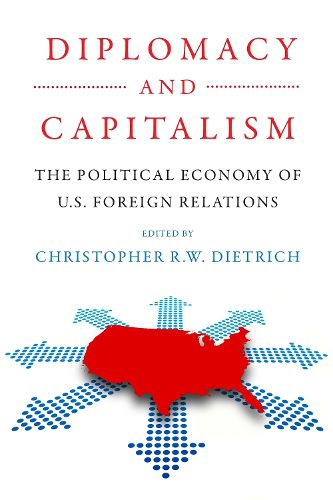Readings Newsletter
Become a Readings Member to make your shopping experience even easier.
Sign in or sign up for free!
You’re not far away from qualifying for FREE standard shipping within Australia
You’ve qualified for FREE standard shipping within Australia
The cart is loading…






At the same time as modern capitalism became an engine of progress and a source of inequality, the United States rose to global power. Hence diplomacy and the forces of capitalism have continually evolved together and shaped each other at different levels of international, national, and local transformations. Diplomacy and Capitalism focuses on the crucial questions of wealth and power in the United States and the world in the twentieth century. Through a series of wide-ranging case studies on the history of international political economy and its array of state and non-state actors, the volume’s authors analyze how material interests and foreign relations shaped each other. How did the rising and then disproportionate power of the United States and the actions of corporations, creditors, diplomats, and soldiers shape the twentieth-century world? How did officials in the United States and other nations understand the relationship between foreign investment and the state? How did people outside of the United States respond to and shape American diplomacy and political-economic policy? In detailed discussions of the exchanges and entanglements of capitalism and diplomacy, the authors answer these crucial questions. In doing so, they excavate how different combinations of material interest, geopolitical rivalry, and ideology helped create the world we live in today. The book thus analyzes competing and shared visions of international capitalism and U.S. diplomatic influence in chapters that bring the book’s readers from the dawn of the twentieth century to its end, from Theodore Roosevelt to Ronald Reagan.
Contributors: Abou Bamba, Giulia Crisanti, Christopher R. W. Dietrich, Max Paul Friedman, Joseph Fronczak, Alec Hickmott, Jennifer M. Miller, Alanna O'Malley, Nicole Sackley, Jayita Sarkar, Erum Sattar, Jason Scott Smith.
$9.00 standard shipping within Australia
FREE standard shipping within Australia for orders over $100.00
Express & International shipping calculated at checkout
At the same time as modern capitalism became an engine of progress and a source of inequality, the United States rose to global power. Hence diplomacy and the forces of capitalism have continually evolved together and shaped each other at different levels of international, national, and local transformations. Diplomacy and Capitalism focuses on the crucial questions of wealth and power in the United States and the world in the twentieth century. Through a series of wide-ranging case studies on the history of international political economy and its array of state and non-state actors, the volume’s authors analyze how material interests and foreign relations shaped each other. How did the rising and then disproportionate power of the United States and the actions of corporations, creditors, diplomats, and soldiers shape the twentieth-century world? How did officials in the United States and other nations understand the relationship between foreign investment and the state? How did people outside of the United States respond to and shape American diplomacy and political-economic policy? In detailed discussions of the exchanges and entanglements of capitalism and diplomacy, the authors answer these crucial questions. In doing so, they excavate how different combinations of material interest, geopolitical rivalry, and ideology helped create the world we live in today. The book thus analyzes competing and shared visions of international capitalism and U.S. diplomatic influence in chapters that bring the book’s readers from the dawn of the twentieth century to its end, from Theodore Roosevelt to Ronald Reagan.
Contributors: Abou Bamba, Giulia Crisanti, Christopher R. W. Dietrich, Max Paul Friedman, Joseph Fronczak, Alec Hickmott, Jennifer M. Miller, Alanna O'Malley, Nicole Sackley, Jayita Sarkar, Erum Sattar, Jason Scott Smith.